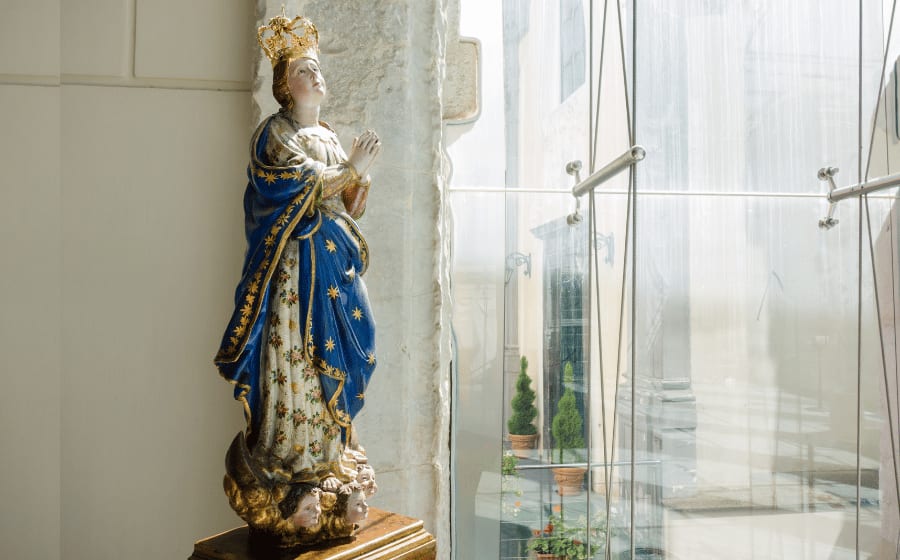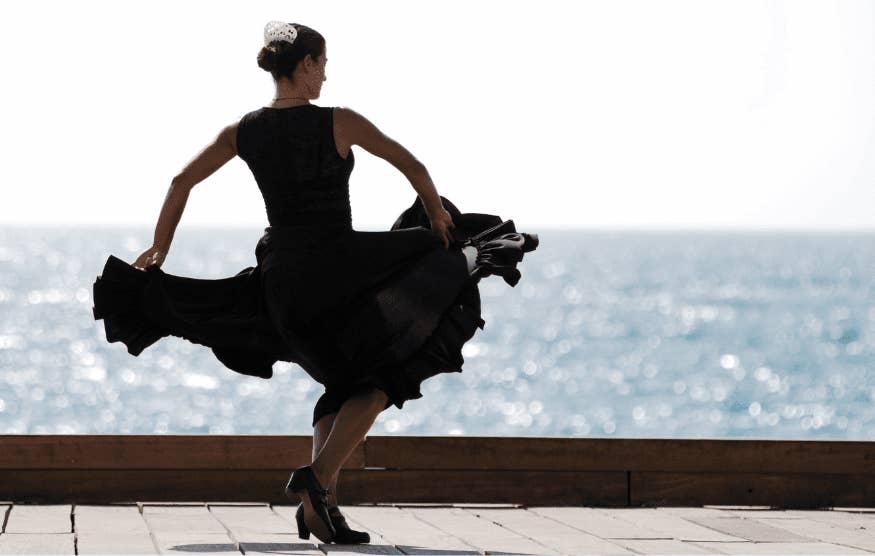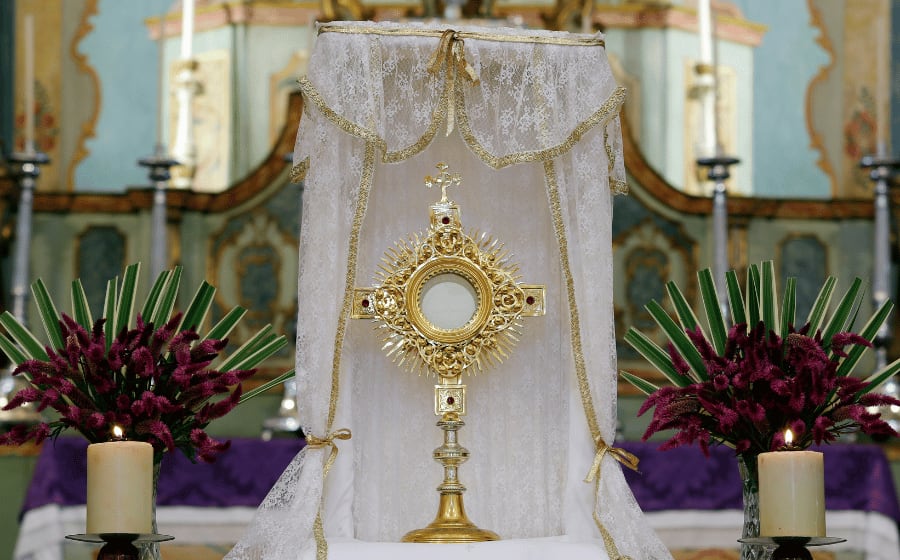Is Spain Religious? N° of Catholics & Other Important Data
December 20, 2022
Win a FREE Trip to Spain!
Exciting Announcement! For the first time, we're thrilled to offer exclusive trips to the heart of Spain - an experience like no other. This isn't your typical tourist journey; it's a unique opportunity to immerse yourself in authentic Spanish culture, alongside real locals and our passionate team.
But there's more! Simply by requesting information about this amazing trip, you'll be entered into a special draw to win a Fully Paid Trip to Spain for Two. And that's not all - everyone who inquires will receive an exclusive bonus gift, valued at $500, available only now.
Ready to Discover the Real Spain?Click Here ↑ to Request Information & Enter the Draw!
How religious is Spain? Today, how religious is the country that spread Catholicism worldwide in the 14th century? Spain and religion have a long history, but that doesn’t mean the relationship is strong.
Almost 50% of Spanish identify as Catholics, but for most, that is just a cultural reference. People follow traditions and rituals because of family, but what do they believe in today?
After reading this article, you will know what the predominant spiritual beliefs in Spain are, and you will be able to determine if Spain is a religious country or not.
With no further ado, let’s dive into some data and very (very) essential history trivia.
Table of Contents ▼ ▶
How religious is Spain?
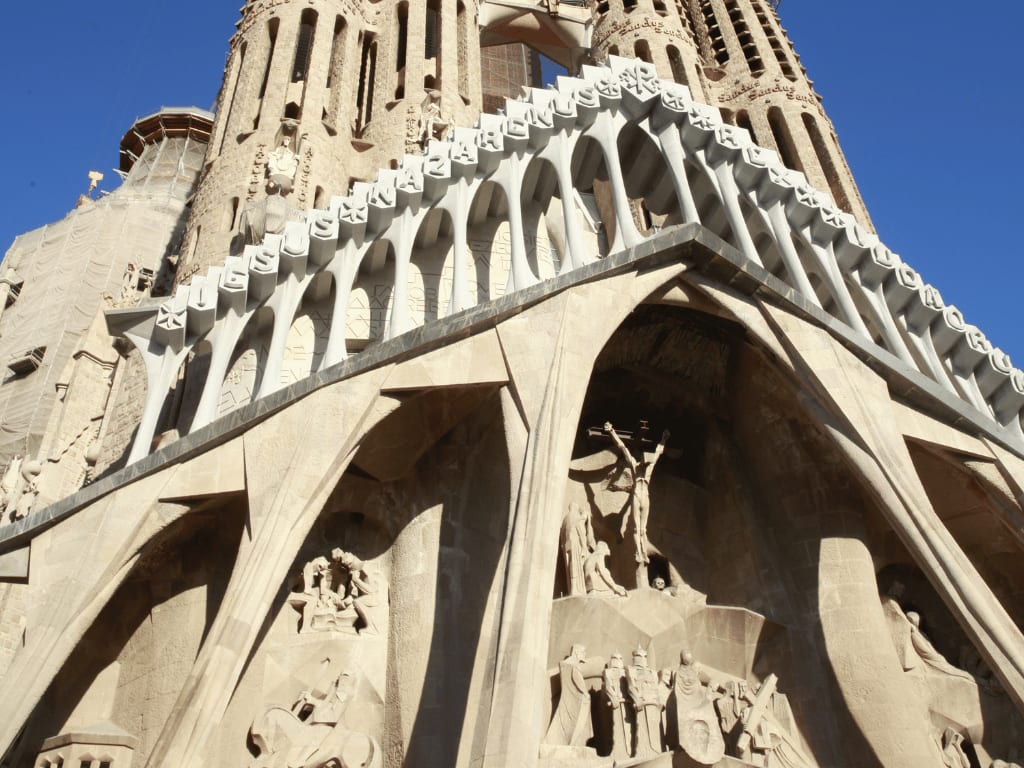
How religious is Spain? To answer this question, I had to get data from specialists on the subject. The Pew Research Center published a study on religious commitment in which Spain ranked 16th out of 34 European countries. Spaniards are between committed practicing people and non-religious people.
In addition to the latter, only 21% considered themselves “highly religious,”; while 25% say they believe in God with absolute certainty. And on top of that, it is essential to recognize that during Franco’s dictatorship Christianity was the rule. After he died, in 1978 the government added an article on Religious Freedom. From then on, the level of religious practice decreases each year; the story behind this is long, but I will give you an essential summary below.
Is Spain considered Catholic?
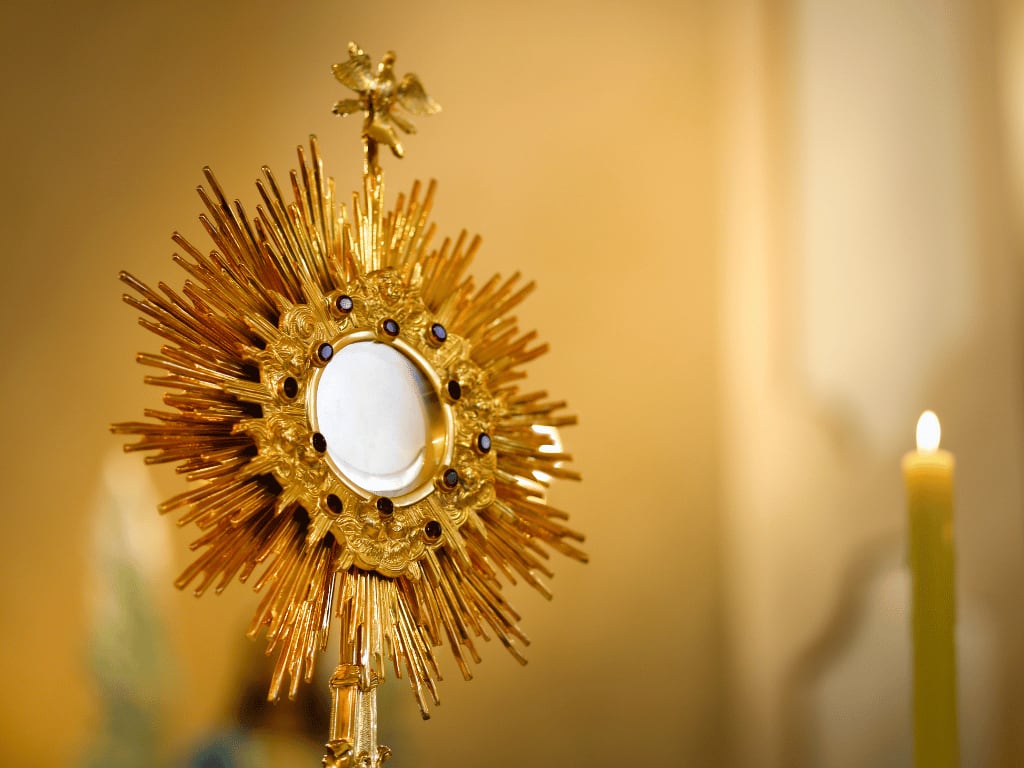
Spain is considered a Catholic country due to its history, but the numbers of recent years say the exact opposite. In 2013, 73% of Spaniards considered themselves Catholics, and nine years later, that number decreased by 16%, with now 57% of Spanish people openly sharing that they believe and practice Catholicism.
Saying that 57% of people declared themselves Catholics is one thing, but being actively committed to the community is entirely different. Of the latter group, more than 60% say they are Catholics but rarely attend mass. In comparison, only 16% say they are practicing believers, attend every Sunday mass, and show compromise to the most important holidays.
So, after seeing the reality of these numbers, it’s safe to say that today Spain is considered Catholic country, but only a minority of the population is committed to the actual practice of the religion. Actually, the number of true beliefs is the same as the 16% categorized as non-believers.
What are the main religions in Spain?
Until now, we have analyzed two essential questions “How religious is Spain?” and “Is Spain considered Catholic?”. For the first question, we found out that Spain occupies position 16th of 34 countries; it is in the middle of a balance between a religious and non-religious country. From that middle point, we move on to the second question and discover that Spain is considered Catholic for tradition’s sake instead of genuine faith.
So, when it comes to major religions, Catholicism comes first again. However, of that, 53-57% identify as Catholics, 35.2% are non-practicing; and what does this mean? It means that a considerable part of the Spanish population accepts Catholicism as culture. They don’t believe in the Holy Trinity or attend mass, but they celebrate saints’ holidays and fulfill the sacraments mandated by the church, which are deeply rooted in families. For example, every city in Spain has a Saint Patron, and the Saint’s birthday is considered a holiday for everyone. Another example of this could be non-religious family members attending baptisms and first communions because family is family.
Again from the 53-57% of Catholics, only 18% are practicing believers. This means they have faith in the “Holy Trinity,” the Virgin, and comply more with the Church sacraments out of love for God rather than cultural obligation.
What are the minor religions in Spain?
Now, before getting into details on the minor religions in Spain, let us remember that many people either don’t identify with any religion or don’t believe in anything at all. This group of citizens represents 40% of the population, and they are divided into three groups: Atheists (13.3%), Agnostic (12.8%), and non-religious (13.1%).
Now, let us begin with the minor religions in Spain. People in Spain with other faiths represent 3% of the population, and these religions are Islam, Protestantism, and Judaism. Protestants have the most places of worship after Catholicism of these three religions, with 4,300 spread throughout the country. The presence of Protestantism and Islam in Spain is not due to the Spaniards converting but primarily because of immigration. It has been registered that most Protestants come from other places in Europe and Latin America.
Likewise, most Islam believers are Moroccans, and the government registered around 1 million Muslims between Andalusia and Catalonia.
Judaism is the third of Spain’s three minor religions. Just like the Muslims, the Jews also share an important piece of history with the Catholic kings, which we will mention in a bit. This group represents 0.2% of the population.
Other minor religions in Spain are Hindus, Buddhists, Pagans, Taoists, and Baha’ís.
Is Spain considered a tolerant country
Legally, the Spanish Consitution established that this is a country of religious freedom since 1978. However, the country is only sometimes tolerant. On the one hand, Spain has an open mentality, but crimes with religious motivation as a motive in the 5th most common form of discrimination. The government is dealing with this step by step.
The Decline of Religious Practice in Spain
The decline of religious practice in Spain didn’t come from anywhere; Spain has years and years of history with religion. Now, I will mention the two most significant events that established intolerance and rejection in the hears of many.
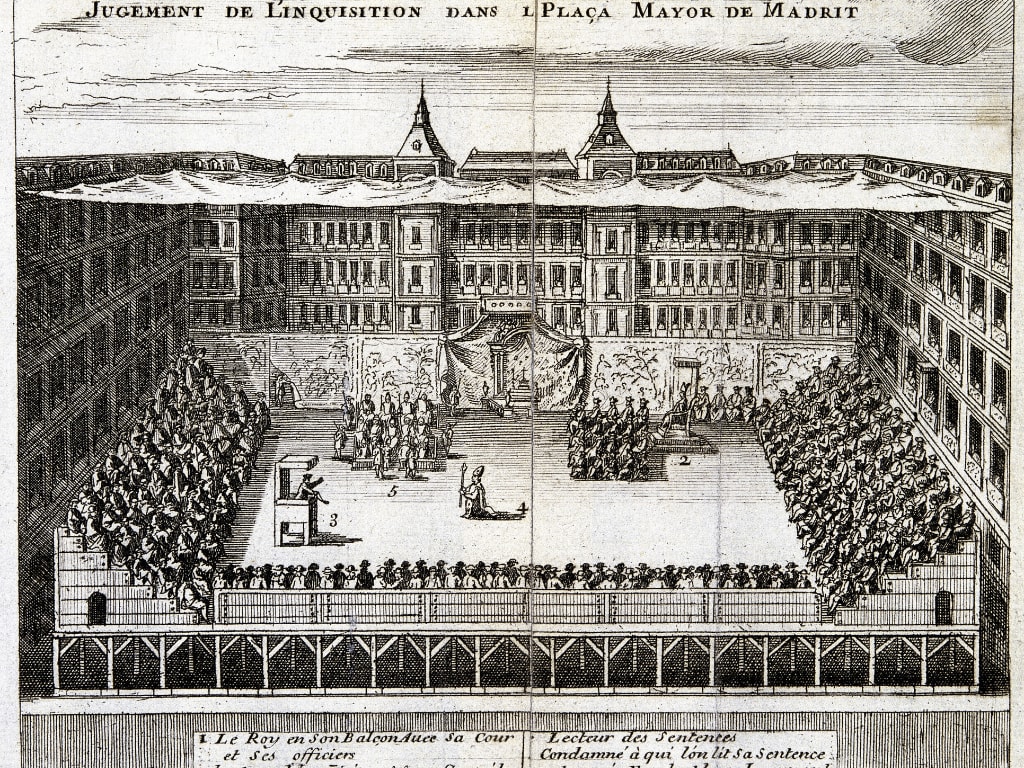
Spanish Inquisition
In 1478, the Catholic Kings, Queen Isabella and Ferdinand II, received a decree from Pope Sixtus IV that authorized the monarchs to rule out heresy; in 1481, the Spanish Inquisition began. Even though the facade of the Inquisition seemed that it was a fight for Catholicism, the reality is another one.
The monarchs argued that the Inquisition would achieve religious unity by punishing others for their heresy. Still, the truth is (as always) that all they cared about was consolidating their power and getting some profits. You will get the explanation for this in a bit.
So, after having permission to rule out heresy, the Catholic Kings began persecuting Jews and Muslims. Both religions had lived peacefully with Christians for years; actually, because of that, Toledo was called the city of the three cultures.
The Inquisitors began with the Jews. In 1492 Tomás de Torquemada’s commanded that all Spanish Jews had four months to convert or leave the kingdom. This order was religious and economical, and most of these people belonged to the upper-middle class, and once expelled, the kingdom would appropriate everything.
Then, in 1609 they did the same with the Moorish, causing over 300,00 to leave the country.
The Spanish Inquisition lasted 350 years; it was begun by Isabella I and ended by Isabella de II in 1834.
The Spanish Inquisition was the first part of the story, repressing people for their beliefs, and the second came in the 20th century with Franco’s dictatorship. The actions committed during that period later caused the religious practice to decrease.
Civil War
After Franco won the Civil War, he installed a National Catholicism, which made the religion the official practice in Spain and gave the Church power to mandate in people’s public and private lives.
Franco’s dictatorship lasted thirty-six years. During all those years, National Catholicism was part of the dictator’s ideology. Franco’s mindset was aligned with Hitler and Mussolini, so many were persecuted. People couldn’t decide to be non-religious, civil marriage wasn’t allowed, Jews were tormented, and even Protestants weren’t allowed to give a proper burial to their death because the church didn’t approve it.
Franco’s regimen showed violence and intolerance towards non-Catholics. The moment he died, and the National Catholicism was abolished, the Christian community began to decrease, and it has kept that tendency until today.
Graphic of religions in Spain
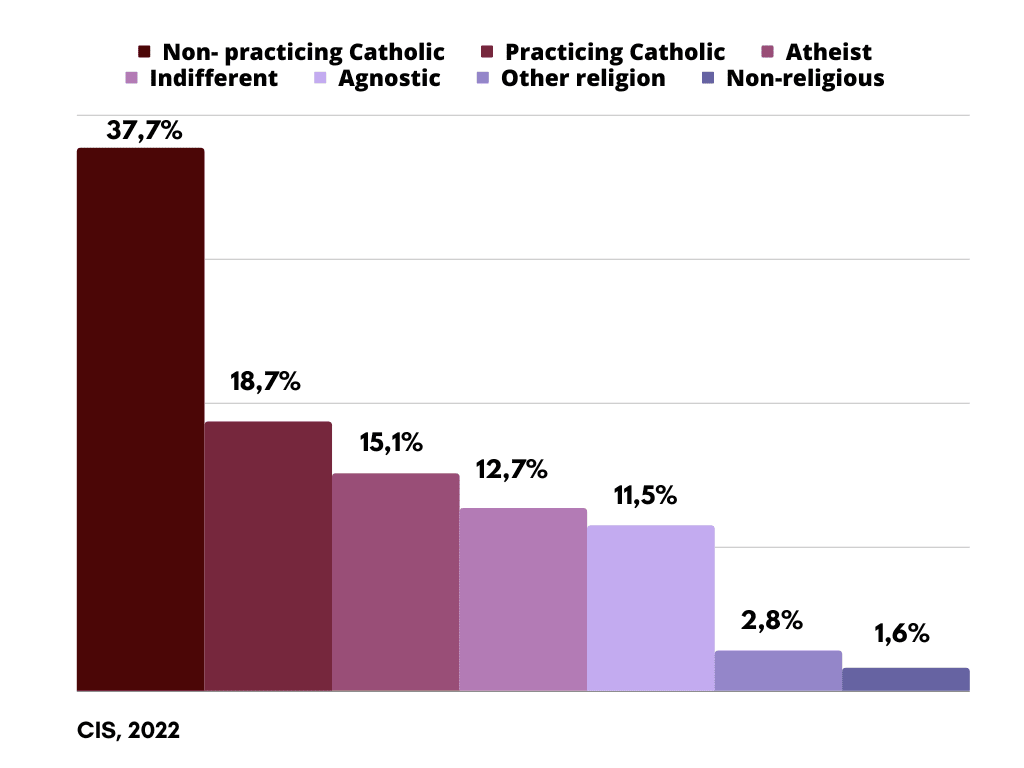
This article has all the current information on Spain’s religions, and its going to be constantly updated as society changes. Today, Madrid and Barcelona are two of the most tolerant and diverse cities in Spain. Everyone is welcome and all those who visit find their place. Little poetic? Maybe, but these cities benefit from the variety of cultures and the differences makes them unique.
Sources:
- Minority Religions in Spain, Statista
- Share of the Spanish population who consider themselves Catholic from 2011 to 2022, Statista
- How do European countries differ in religious commitment? Use our interactive map to find out, Pew Research Center
- Distribution of the Spanish population as of September 2022, by religious beliefs, Statista
- Religious Persecution under Franco’s Dictatorship, Ser Histórico



